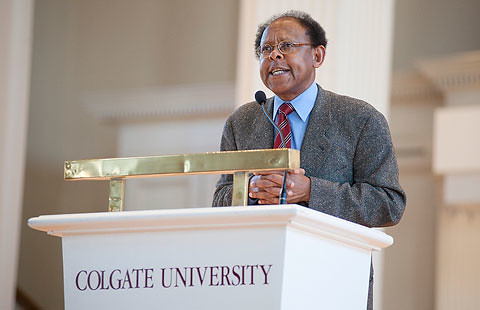James H. Cone, widely credited with founding the black theology movement, spoke Thursday in Memorial Chapel about his seminal works from nearly 40 years ago and his current research, which focuses on the emotional symbols of the cross and the lynching tree.
Cone said his lecture was intended to start a conversation, and students and faculty members took him up on that as they asked questions about everything from atheism to President Obama’s impact on race relations.
 |
| James H. Cone speaks at Memorial Chapel on Thursday. (Photo by Andy Daddio) |
It was the 1967 race riots in Detroit and the assassination of Martin Luther King Jr. a year later “that shook me out of my theology of complacency,” said Cone. He came to believe that a Christian identity in the United Sates was impossible without fighting white supremacy and supporting black efforts for justice.
Cone would gain widespread attention for his books Black Theology & Black Power (1969), A Black Theology of Liberation (1970), and God of the Oppressed (1975).
He talked about how he embraced the principles of both King and Malcolm X. It was a position that would thrust him into the sometimes heated political discussions about racism in America.
“My Christianity could not be separated from my blackness,” he said, adding that it was not easy to develop both in a country that viewed Christianity as white and black Americans as evil.
|
Cone’s lecture was the first in the Arthur W. ’40 and Anne Hale Johnson Religion and Ethics in America Lecture Series. It was sponsored by the Department of Religion, the Brothers student organization, and the Office of the Chaplains.
The lecture was titled “Strange Fruit: The Cross and the Lynching Tree.” The words strange fruit refer to the bodies of lynched African Americans dangling from trees.
Peppering his impassioned lecture with references to spirituals and blues and Billie Holiday songs, Cone spoke about the pain and dread the lynching tree evoked in African Americans, and how the memories of white mobs cheering as innocent blacks were lynched were almost too painful to endure.
But blacks saw their faith as something that white people could not control, and how just like Jesus did not deserve to suffer on the cross, they did not deserve to suffer on the lynching tree.
“The power of the cross gave them hope,” said Cone.
Without these past struggles for equality, Obama would not have been in the position to be elected president, said Cone.
But the struggle isn’t over, and Cone used the word tokenism in saying that it took 200 years to elect an African American as president and it might be another 200 years before it happens again.